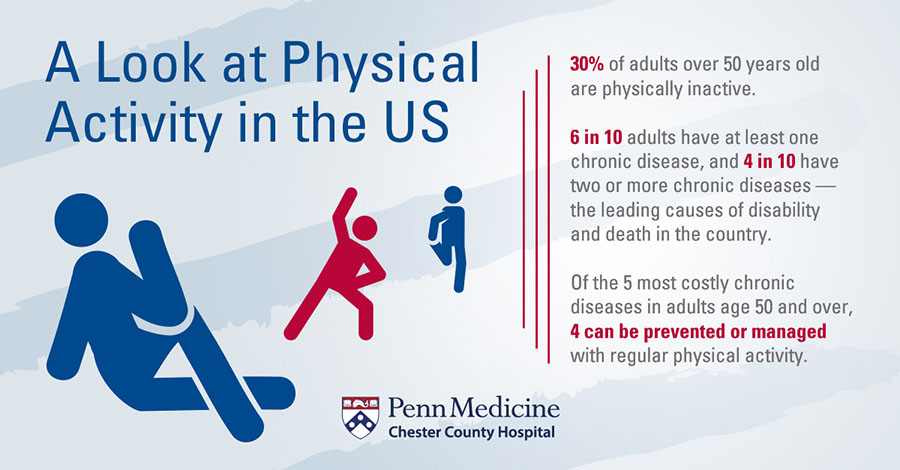Your body is a lot like a car — both need to be provided quality fuel, maintained with regular check-ups, and cared for when something goes wrong.
Additionally, cars and bodies both need to be used. A car that sits in storage for years should be driven periodically to keep its battery, engine, and other components working effectively. Similarly, regular physical activity will help delay, prevent, or manage chronic health problems and keep your body healthy as you age.
Despite the many benefits of physical activity, adults in the US aren't getting their bodies moving as much as they should.

Staying active in any situation can be challenging, but during the COVID-19 pandemic, factors like closed gyms and critical social distancing may make it more difficult to ensure you're getting enough exercise.
Here's why you should incorporate more physical activity in your daily routine — and how you can do so during the COVID-19 pandemic.
What Benefits Does Physical Activity Provide?
From health problems to newfound pain to worries about falling, there are plenty of reasons why people tend to become more inactive with age. However, exercise is more important than ever as you get older, providing benefits for both your physical and mental health.
Physical health benefits of exercise include:
- Maintaining or losing weight, especially as your metabolism naturally slows down with age
- Lowering your risk of illness and chronic disease, such as Alzheimer's disease, diabetes, obesity, heart disease, osteoporosis, and certain cancers
- Enhancing your flexibility, balance, and mobility, which reduces the risk of falls and helps alleviate pain, such as arthritic pain
Mental health benefits of exercise include:
- Improving sleep, which helps you wake up feeling more refreshed and energized
- Boosting your mood and confidence, as endorphins produced during exercise can relieve feelings of sadness, depression, and anxiety
- Keeping your brain healthy, such as improving creativity and preventing memory loss
Pandemic-Friendly Ways to Stay Active
Exercise is completely safe for most adults over the age of 65, even if you have a chronic condition like heart disease, diabetes, or arthritis. For instance, light walking is usually to be a great place to start. Still, if you're unsure what kinds of exercise are safe for you, talk to your healthcare provider.
Remember — some exercise is better than no exercise. Start small, and work your way up to the recommended amount of exercise, which is 2 hours and 30 minutes of moderate-intensity aerobic exercise and 2 muscle-strengthening activities each week. In addition, you should also engage in regular balance and flexibility activities.
As many gyms are closed and it remains critical to keep your distance from those outside of your household, you may need to change up your exercise routine slightly. However, there are plenty of pandemic-friendly exercises to keep you moving.
Pandemic-friendly endurance exercises include:
- Taking a socially distanced walk or bike ride
- Climbing the stairs in your house or apartment building
- Raking or mowing your lawn
- Playing tennis with people from your household
Pandemic-friendly strength exercises include:
- Lifting weights (use bottles of water or cans of food if you don't have weights at home )
- Using a resistance band
- Doing body weight exercises, such as sit-ups and push-ups
Pandemic-friendly balance and flexibility exercises include:
- Simple exercises, such as standing on one foot, walking heel to toe, and standing up from a sitting position
- Tai chi
- Yoga
- Stretching exercises
Exercise during a pandemic may require some creativity, such as using household items for weights or rearranging your furniture to make space for your workout.
Keep in mind — the internet is full of resources, such as exercise videos, live virtual classes, and easy-to-follow exercise tutorials.
Debunking Myths About Exercising As You Age
Getting enough exercise can be tough at any age. As you get older, you may face new challenges like aches and pains, concerns about falling, and feelings of discouragement. Plus, you may feel like starting an exercise routine late in life isn't beneficial.
All of these concerns are actually the reason why getting moving is so important for older adults. On top of preventing illness, regular exercise helps relieve pain, prevent falls, and enhance your confidence and self-esteem. Plus, it keeps you independent for longer.
At any age, it's important to make sure you exercise safely. In addition to talking to your healthcare provider before starting an exercise routine, listen to your body and don't engage in physical activity if it's painful. Wear comfortable and sturdy shoes, and don't exercise if you're not feeling well.
Whether you're 20 years old or 80 years old, the benefits of exercise are hard to ignore. Focus on the short-term goals, and reward yourself for sticking to your routine. Over time, you may learn to love your daily workouts — and your body will thank you for keeping it healthy.
Do you have questions about staying active as you age? Call 610-738-2300 to find a healthcare provider on the medical staff at Chester County Hospital.
Learn more about exercising safely during the COVID-19 pandemic.
Related Information from Chester County Hospital: